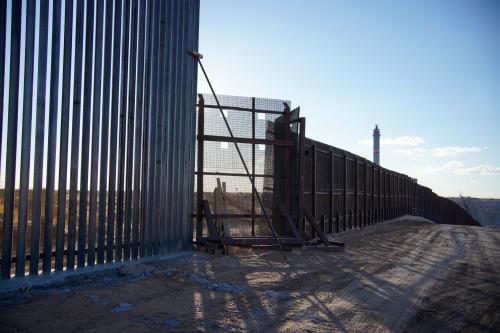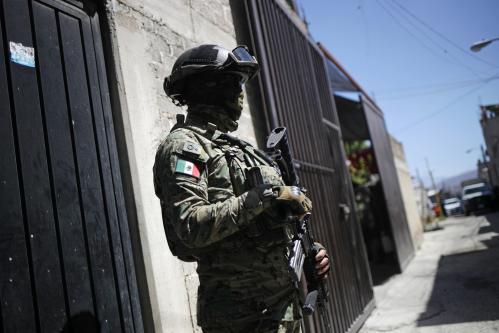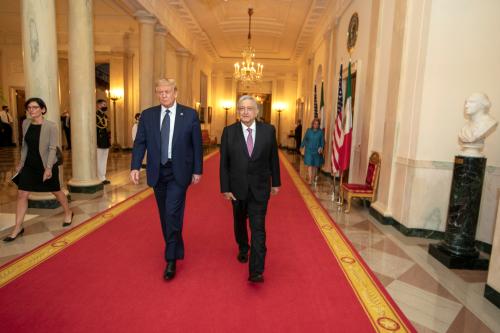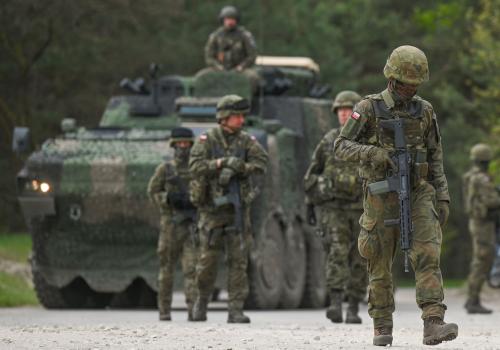 The 20th anniversary of al-Qaida’s terrorist strikes against the United States has been marked by a tsunami of ink over what these two decades have meant for Washington’s interests and agenda in the Middle East, the fight against terrorism, and the country’s grand strategy and global geopolitical heft; it has also been framed by the Biden administration’s withdrawal from Afghanistan. However, little bandwidth has been dedicated to one bilateral relationship which was truly impacted and transformed — in both negative and positive terms — as a result of the attacks.
The 20th anniversary of al-Qaida’s terrorist strikes against the United States has been marked by a tsunami of ink over what these two decades have meant for Washington’s interests and agenda in the Middle East, the fight against terrorism, and the country’s grand strategy and global geopolitical heft; it has also been framed by the Biden administration’s withdrawal from Afghanistan. However, little bandwidth has been dedicated to one bilateral relationship which was truly impacted and transformed — in both negative and positive terms — as a result of the attacks.
A few days before 9/11, on September 5, President George W. Bush hosted Mexican President Vicente Fox for the first state visit of his administration. Bush’s first trip abroad as president had in fact been to Mexico. I was then head of the Mexican Foreign Ministry’s Policy Planning Staff and part of Fox’s delegation. Watching the fireworks display on the Mall that Bush had organized in honor of his counterpart, then-Senator Joe Biden, standing behind me on the White House steps leading down to the South Lawn, slapped me on the back and exclaimed, “Man, does this president like you guys!” And indeed, the relationship between the leaders, both elected the year before, had gotten off to a stellar start. Mexico City was rethinking priorities and Washington asserting the paramount importance of the relationship with Mexico, and for the first time Mexico was driving the diplomatic conversation by putting on the table an ambitious agenda for comprehensive immigration reform including enhanced border security measures and a temporary worker program for circular labor mobility, believing there was room to work on dramatically moving the goalposts of an issue that had bedeviled the bilateral relationship (and does to this day). Sitting in my office back in Mexico City after the visit and watching in disbelief and horror as the World Trade Center towers collapsed, I immediately knew that that agenda would be completely recast. What followed was the proverbial story of opportunities lost and opportunities gained.
What became self-evident in the weeks following the attacks was that in many ways, Mexico had become a victim of its own success. Until that moment, Bush — a former governor of the border state of Texas who had had a firsthand understanding of the critical relevance of Mexico to the U.S. — had been personally driving the agenda with Mexico. As his attention shifted to Afghanistan and the looming “war on terror,” Mexico lost the principal advocate for developing a strategic bilateral relationship and for a whole-of-government approach within the administration. As Mexican Foreign Secretary Jorge Castañeda conveyed to Secretary of State Colin Powell in his office at the State Department in a one-plus-one meeting in which I participated, the terrorist attacks only underscored the importance of moving forward with the discussions with Mexico, particularly regarding some form of legal status for the millions of undocumented immigrants (the majority from Mexico) in the United States. As our talking points went, it was critical to know who they were and where they lived, and to bring them out of the shadows. But our arguments fell on deaf ears.
To make matters worse, President Fox’s bumbling, hesitant, and tone-deaf response to the attacks, heading the poor advice of his interior secretary and chief of staff disparaging and counselling against the idea of a public display of solidarity with the U.S. during Mexico’s National Independence Day ceremony on September 15 lost Mexico much of the goodwill — both in the administration and on Capitol Hill — that had been accrued just a few days earlier during the state visit. Going forward, the Fox government had a hard time readjusting to the new realities in Washington. And to add insult to injury, in 2003, once the U.S. unwisely decided to go down the road of invading Iraq — which Mexico, as a non-permanent member of the United Nations Security Council (UNSC), rightly and presciently opposed along with other UNSC members — instead of personally reaching out to Bush and explaining to a partner and erstwhile close friend why Mexico would vote the way it finally did, Fox decided to hide under his desk and avoid taking his American counterpart’s calls, subsequently proceeding to grandstand as to why Mexico had bucked U.S. pressure and voted against Washington in the Security Council.
As much as 9/11 derailed both the personal relationship between Bush and Fox and the immigration agenda, it also had a transformative effect for security cooperation, one area that had always lagged in the tectonic shift in bilateral ties wrought by the decision a decade earlier to negotiate a free trade agreement. Since the early 1990s — and over the decades since — Mexico and the United States had profoundly transformed their relationship. Driven first by the huge socioeconomic convergence triggered by the North American Free Trade Agreement (NAFTA), and then by the growing and more assertive security and intelligence cooperation that arose out of the security and border imperatives of a post-9/11 world, both countries started to slowly build a strategic and forward-looking partnership predicated on shared responsibility and the challenges and opportunities of a 2,000-mile land border. Moreover, the creation of the Department of Homeland Security (DHS) and the reorganization of the unified combatant command architecture in the U.S. with the creation of Northern Command (NORTHCOM) forced Mexico to engage in a qualitatively different — albeit ponderous — way. What drove this was the fundamental realization that if the U.S. ever came to perceive that Mexico and a porous border could morph into a national security vulnerability for terrorists and nonstate actors to exploit, the trade and economic agenda, and the relationship built since NAFTA as a whole, would grind to a halt. Common prosperity and common security became irrevocably intertwined, and rightly so.
This is what at the end of the day provided for a partial recovery and renewed traction and impetus for pursuing a more ambitious bilateral agenda. DHS became a new and key player in the relationship and Mexico and the U.S. engaged in an unprecedented level of intelligence sharing, for example sharing passenger lists of all aircraft flying into Mexican airspace and individuals on watch lists, preventing “visa shopping” (individuals denied a visa for the U.S. trying to obtain one to enter Canada or Mexico), and implementing trusted traveler programs. Military-to-military cooperation started to move forward, albeit slowly, to the point where a few years later, Mexican army, air force, and navy liaisons had been permanently posted to NORTHCOM headquarters in Colorado Springs. Discussions over managing pandemics (which served the countries so well in 2009 with H1N1) or disruption of essential regional supply chains for the three North American neighbors were borne of this paradigm shift.
Undoubtedly much still needs to happen to build upon the promise of a truly strategic relationship between Mexico and the United States that the 9/11 terrorist attacks foisted on both nations. For starters, Mexico cannot continue to be a strategic afterthought or taken for granted by U.S. national security and foreign policy interests — as it has remained in the 21st century notwithstanding greater awareness of its security salience for the United States. And Washington and Mexico City — and indeed Ottawa too — need to enhance North American common domain awareness across the board, whether it’s our continued efforts to ensure that Mexican soil and the U.S.-Mexico border are not used by rival nations or nonstate actors to threaten or undermine homeland security in the United States or our engagement on a whole series of fronts: transnational organized crime; cybersecurity; transmigration flows; energy security, efficiency, and independence for North America; or water resources on the border.
The dilemma that 9/11 thrust upon us was that our two nations needed to stop playing checkers and start playing chess. Twenty years after the heinous attacks on U.S. soil, a sober, honest assessment of U.S. interests vis-à-vis Mexico needs to take place in Washington. Mexico in turn needs to come to grips with the importance of deepening and widening security cooperation writ large (not only in terms of law enforcement) with its northern neighbor. Our societies are truly interconnected, with millions of Mexicans and Americans living abroad making their homes in the U.S. and Mexico, respectively. The implications of 9/11 compelled our two nations to jointly take on security and intelligence cooperation, albeit with the occasional hiccup — and with governments on either side of the border that have not understood this critically important agenda of broad, holistic, and forward-looking strategic and national security engagement and collaboration based on a paradigm of shared responsibility, or that have even tried to torpedo the relationship itself. Leaders in Washington and Mexico City today stand at a crossroads: at stake is the security and prosperity of millions of Americans and Mexicans and, despite the challenges inherent to such an asymmetrical relationship, more than two decades of a success story of strategic, diplomatic, and security convergence and greater and mutual interdependence.






Commentary
9/11 transformed US-Mexico relations
September 17, 2021